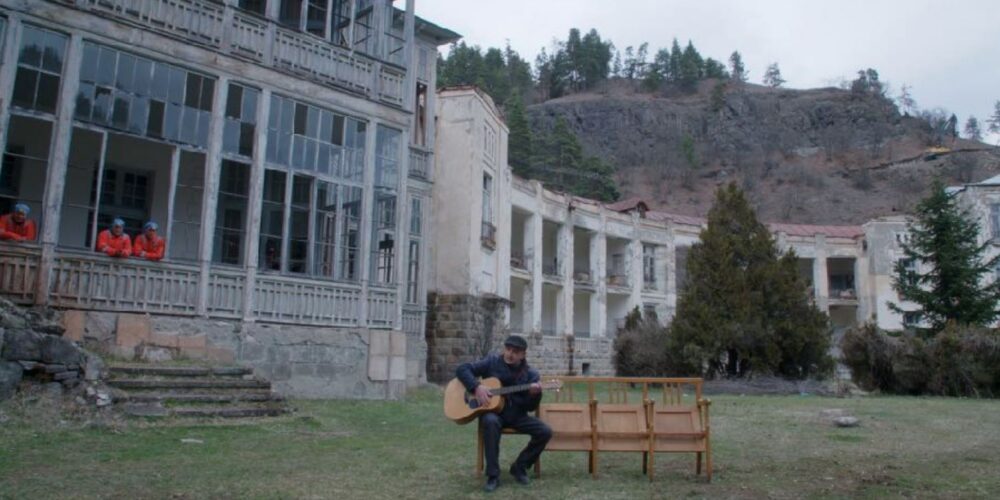“A forgotten past is a past that is yet to be. A forgotten history is a memory missing from our collective conscience. An incomplete history is like an incomplete mind that has forgotten who it is and where it came from.”
Opening a documentary with this quote from Quoting A.E. Samaan works for a film that deals with history or social amnesia. You wouldn’t expect to see this via title cards to start a documentary based on the filmmaker’s experience suffering from tuberculosis in her younger years. And yet, with Mariam Chachia and Nik Voigt‘s film “Magic Mountain” (Georgian: ‘ჯადოსნური მთა’), it works. Because as the film progresses, what began as a documentary about overcoming one’s fear becomes something else — something more important.
[More MoMI 2024 Coverage: ‘Mimang’: A Slow-Burn Mumblecore Meditation on the Passage of Time]

“I never believed in ghosts or magic until I met you, Abastumani”
In “Magic Mountain,” we learn that Chachia contracted tuberculosis when she was young, and was sent to the Abastumani sanatorium to recuperate. Thanks to the medicines, Chachia recovered, but not without any hitches. For years, she has been having nightmares about the place, which kept appearing in her dreams.
Together with her partner and co-director Voigt (who also assumes both the editing and camerawork), Chachia decides to revisit the sanatorium to tell its story. Arriving at Abastumani, a remote facility nestled in the Georgian mountains, the filmmakers focus on the facilities, the architecture, and its overall haunting vibe.
“Magic Mountain” also shows the daily lives of the patients in the sanatorium, ranging from light-hearted moments to struggles with illness and addiction. While it doesn’t provide a level-headed approach in capturing them, the film nonetheless manages to show these characters and their lives inside the bubble.
In the morning, Abastumani resembles an old hospital where patients queue up for medication. In the afternoon, the sanatorium transforms into a social center where patients pass the time gambling under a cloud of cigarette smoke. And at night, long after the Soviet-era doctors have left, Abastumani becomes a chaotic, nearly free-for-all place where alcohol and drugs incite violence among patients.
From Routine and Isolation to Uncertainty and Melancholia
Everything takes the back seat, however, when a Georgian oligarch discovers Abastumani one day. Liking Abastumani’s location, he purchases the building with the intent of demolishing it and building his own villa. Suddenly, the mood shifts from the ennui and monotony of isolated life, to meditations about life and the present that would soon become just memories of the past.
Apart from its title, the documentary film clearly borrows a handful of elements from Thomas Mann’s modern classic “The Magic Mountain.” Only here, Chachia and Vogt didn’t go to a sanatorium to visit a tubercular cousin; instead, they trek Abastumani so Chachia could face her fears. She acknowledges how tuberculosis had such a strong stigma attached to it that only her family knew about it. This conscious effort to hide her illness from social judgment made her decide to revisit Abastumani
Chachia’s narration guides viewers through this eerie world, blending her own reflections with the stories of the sanatorium’s inhabitants. Voigt’s cinematography captures the majesty of the mountains, juxtaposed with the stark reality of life within Abastumani. What I loved about the latter’s work behind the camera is how he was able to highlight not only the isolation, but also the blend of sadness and melancholia in the patients.
Finally, top marks go to the sound editing by amplifying the sense of dread and mystic Abastumani holds for having served as a permanent home to several patients who never made it out.
‘Magic Mountain’: A Microcosm of a Nation Still Grappling with Its History
Overt inspirations aside, “Magic Mountain” dives into Georgia’s complex history, from its pre-Soviet glory to its struggles with independence. The demolition of Abastumani reflects the country’s ongoing battle with its past. The filmmakers, in essence, ask the audience:
By destroying something in favor of something new, will it help preserve the past, or hasten its erasure from the society’s consciousness? How can we move forward if we forget the past? And how can we prevent the next generation from repeating history if there is no evidence left?
Through Chachia’s voiceover and Voigt’s lens, Abastumani becomes a microcosm of Georgia — a nation that still struggles with balancing tradition with the modern challenges. The filmmakers clearly aim to leave the audience with a sense of reverence for the stories held within Abastumani’s once-standing walls which, for better or worse, encapsulates a country’s enigmatic past.
In that regard, the film does its job, and then some.